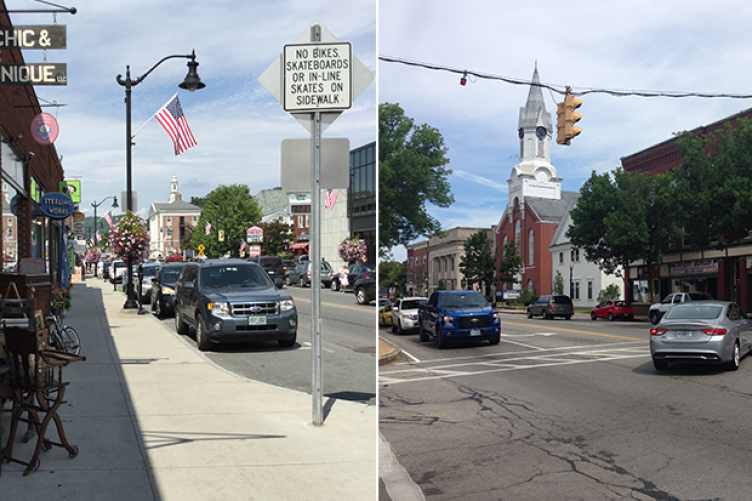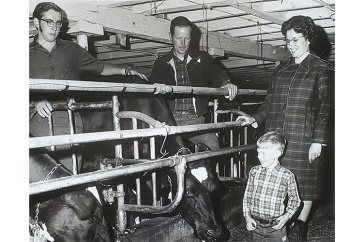
The downtown areas of Littleton (left) and Rochester (right)
It began with paper and a pen.
UNH Cooperative Extension’s Community and Economic Development program coordinator Casey Hancock and field specialist Geoff Sewake were in Brattleboro, Vermont, learning about a secret shopper-style community assessment program called First Impressions. As part of the training, they were asked to walk around the downtown and write their thoughts in a paper booklet. What did they like? What didn’t they like? What did they notice? What could be improved?
But to Hancock and Sewake, using pen and paper for an in-depth field assessment felt inefficient, outdated and not very secret.
Both knew the core of the program had merit and could offer a lot to New Hampshire communities, but they agreed the integration of mobile technology was overdue. They reached out to Shane Bradt, Cooperative Extension’s geospatial technologies specialist, and with his help, they reviewed a number of available mobile technologies that would fit well with the program. The team decided to develop a template for a mobile data collection app called ArcGIS Collector.
New Hampshire’s First Impressions kicked-off in Littleton and Rochester in May 2016. Shortly thereafter, each town sent a group of “secret shoppers” to the other, giving the app template its first field test.
“The mobile app made it look more like we were visitors doing what we normally would — taking pictures and using phones.”
With Hancock and Sewake's app, First Impressions participants were able use their phones — not old-fashioned pen and paper — to record their insights discretely and efficiently. Not only did they collect key data, including photos and videos, they were able to share the information and visualize it on an interactive online map.
“The mobile app made it look more like we were visitors doing what we normally would — taking pictures and using phones,” says Christine DeAngelis, Rochester’s First Impressions committee chair and owner of Epiphany Consulting Group. “Plus, the ability to take and save pictures made it much easier to refer back to after the visit and give more details on our experience.”
Jennifer Marsh, Rochester’s economic development specialist, agrees.
“The mobile app was not only easy to use but it was more interactive than filling out information in a book,” she says. “The group enjoyed the fact that we could instantly see our results. We covered a lot of ground in a four-hour period.”
Beyond being easy to use, the app has also resulted in the collection of more robust data and the ability to analyze it more effectively.
“It was challenging to manage the volume of data,” says Hancock, “But the outcome of organizing the data by asset, opportunity and theme is definitely worth it.”
The New Hampshire First Impressions program is supported by a $10,000 grant from the Northeast Regional Center for Rural Development. The grant provided funding for UNH Cooperative Extension in partnership with Extension services from the University of Vermont, West Virginia University, the University of Connecticut, the University of Minnesota and Michigan State University.
The program helps communities recognize their existing strengths and weaknesses through the eyes of first-time visitors and provides a structured opportunity to learn about strengths and weaknesses of similar communities. The results from a First Impressions visit can serve as the basis for community action and as a way to document changes in the community over time. In New Hampshire, the program’s focus is downtown revitalization.
In August 2016, Hancock, Sewake and Bradt received an Innovation Award from UNH Cooperative Extension for their use of mobile technology in Extension programming. They have also led workshops about using the app at the joint National Association of Community Development Extension Professionals and the Association of Natural Resource Extension Professionals Conference.
As word of the app has spread, the team has been receiving queries from other Extension organizations looking to use the technology for their own First Impressions programs. Hancock reports that they are planning to make the template available for other Extension professionals sometime in the near future.
Since the initial Rochester and Littleton meetings, participants have developed action committees to further address the improvements suggested by the program data. Hancock and Sewake plan to work with the groups through the summer of 2017, as they move from planning to action.
“I do think that the app will have an impact on strengthening the program and its outcomes,” says Hancock. “Groups working on these issues will be able to refer back to the interactive maps we created to examine and visualize where there are clear opportunities for improvement.”
“The project has definitely catalyzed community energy,” agrees Sewake.
-
Written By:
Sarah Schaier | College of Life Sciences and Agriculture
















































